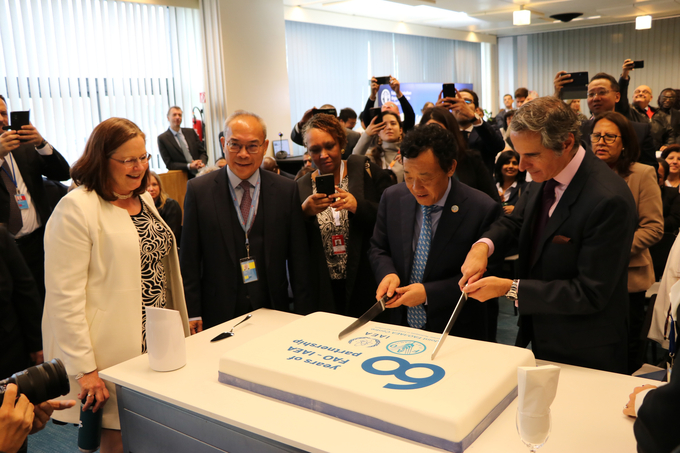May 29, 2025 | 16:47 GMT +7
May 29, 2025 | 16:47 GMT +7
Hotline: 0913.378.918
May 29, 2025 | 16:47 GMT +7
Hotline: 0913.378.918

FAO Director-General QU Dongyu and IAEA Director General Rafael Mariano Grossi celebrate the 60th anniversary of the Joint FAO/IAEA Centre of Nuclear Techniques in Food and Agriculture by cutting a cake together at an event in Vienna.
The Director-General of the Food and Agriculture Organization of the United Nations (FAO), QU Dongyu, today celebrated the 60-year partnership with the International Atomic Energy Agency (IAEA) by underscoring the remarkable advancements achieved by this unique collaboration within the UN system in helping countries produce more with less.
Qu was invited to address a high-level dialogue on The Role of Nuclear Science and Technology in Food and Agriculture - Celebrating 60 years of the Joint FAO/IAEA Centre of Nuclear Techniques in Food and Agriculture, held during an IAEA Ministerial meeting in Vienna.
The Joint FAO/IAEA Centre of Nuclear Techniques in Food and Agriculture was established in 1964 to advance the use of nuclear science to boost food security, agricultural productivity and environmental sustainability.
The event showcased how the Joint Centre has helped improve food safety, soil and water management, animal production and health, insect pest control, and new and better crops over the past 60 years.
In Vienna, QU and Rafael Mariano Grossi, Director General of the IAEA, highlighted how, through six decades of operation, the Joint FAO/IAEA Centre – the only such arrangement within the UN system - has built a legacy of contributions to the agricultural landscape worldwide.
In its early years, the Joint Centre played a key role in advancing nuclear techniques in agriculture, contributing to what is now known as the “Green Revolution.” It also provided guidance to countries in developing more productive and resilient plants through plant mutagenesis and the introduction of nuclear techniques to enhance plant nutrient uptake.
Some of its most notable initiatives in recent years include eradicating the Medfly from the Dominican Republic using ionizing radiation to sterilise male insects, and the launch of Arabidopsis and Sorghum seeds into space, in an experiment designed to develop resilient crops that can provide sufficient food in the face of the climate crisis.
The Joint FAO-IAEA Centre has directly contributed to improving smallholder farmers' productivity through better crops, enhancing resource access through innovations in soil and water management, boosting animal production and animal health, implementing safe and green solutions for pest control, and increasing food safety to ensure the safety of the food that reaches our tables.
The ultimate goal is to produce more with less, the FAO Director-General said.
“Let’s prepare for the next 40 years together,” Qu said of the 60th anniversary celebrations.
The Director-General later addressed a session of the IAEA Ministerial Conference on the Atoms4Food Initiative, a collaboration between FAO and the IAEA launched at FAO’s World Food Forum in Rome in October 2023.
The joint initiative promotes innovative nuclear techniques that enhance agricultural productivity, reduce food losses, ensure food safety, improve nutrition, and adapt to the challenges of the climate crisis.
Its technologies, innovation, and strategic partnerships are pivotal in transforming global agrifood systems to feed the world, eradicate poverty, and ensure the sustainability of the planet’s natural resources.
“With state-of-the-art research and technologies developed through our laboratories, and the tools and platforms that optimise both agencies’ strengths, we can ensure the application of proven nuclear and related techniques in food and agriculture to bring far-reaching benefits at greater scale,” Qu said of the Initiative.
One year after its launch, the initiative now has a roadmap to guide transformation in various areas, including cropping systems, livestock productivity, natural resource management, and food safety, the Director-General said.
To date, ten countries have officially requested support through Atoms4Food, and another four countries are providing financial or technical support in specific areas.
(FAO)

(VAN) Vikas Rambal has quietly built a $5 billion business empire in manufacturing, property and solar, and catapulted onto the Rich List.

(VAN) Available cropland now at less than five percent, according to latest geospatial assessment from FAO and UNOSAT.

(VAN) Alt Carbon has raised $12 million in a seed round as it plans to scale its carbon dioxide removal work in the South Asian nation.

(VAN) Attempts to bring down the price of the Japanese staple have had little effect amid a cost-of-living crisis.

(VAN) Fourth most important food crop in peril as Latin America and Caribbean suffer from slow-onset climate disaster.

(VAN) Shifting market dynamics and the noise around new legislation has propelled Trouw Nutrition’s research around early life nutrition in poultry. Today, it continues to be a key area of research.

(VAN) India is concerned about its food security and the livelihoods of its farmers if more US food imports are allowed.